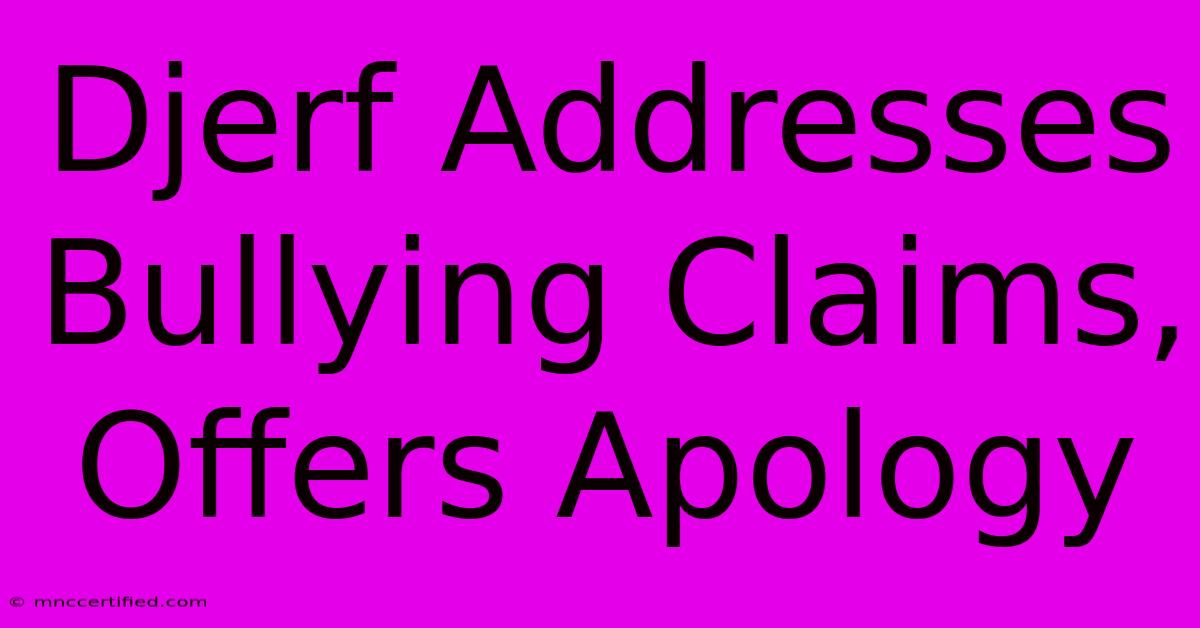Djerf Addresses Bullying Claims, Offers Apology

Table of Contents
Djerf Addresses Bullying Claims, Offers Apology: A Full Breakdown
The influencer world is rarely without controversy, and lately, prominent fashion influencer, Djerf Avenue (also known as Moa Djerf), has found herself at the center of a storm. Accusations of bullying have surfaced, prompting a public apology and a wave of discussion about accountability within the online community. This article delves into the details of the situation, examining the allegations, Djerf's response, and the broader implications for online influencers and their responsibilities.
The Bullying Allegations: What Happened?
Several individuals have come forward with allegations of bullying behavior by Moa Djerf, ranging from instances of public humiliation to private, hurtful interactions. While specifics vary depending on the source, the core claims consistently revolve around Djerf's alleged use of her platform to belittle or shame others, often impacting their mental well-being and professional opportunities. These allegations have been shared across various social media platforms, sparking widespread debate and a critical examination of Djerf's past actions and online presence. The lack of concrete, verifiable evidence in some cases has fueled the discussion, highlighting the complexities of online accountability and the need for thorough investigation when dealing with such sensitive issues. Finding reliable sources and corroborating information is crucial when evaluating such claims.
The Impact of Social Media Amplification
The rapid dissemination of these allegations through social media underscores the power—and potential pitfalls—of online platforms. What might have remained a private matter quickly escalated into a significant public controversy, demonstrating the far-reaching consequences of actions in the digital sphere. This situation serves as a stark reminder for influencers and public figures alike of the importance of mindful online conduct.
Djerf's Apology: A Step Towards Reconciliation?
Following the public outcry, Moa Djerf released a statement offering an apology. The specifics of her apology will vary depending on the platform you see it on but it generally expressed regret for any harm caused by her actions. The sincerity and effectiveness of her apology are currently being debated across social media. Some find it sufficient and a step towards accountability, while others criticize it as insufficient and lacking specific details. The public's reaction highlights the challenging nature of navigating public apologies and the varying expectations of accountability in the digital age.
Analyzing the Apology's Impact
The long-term impact of Djerf's apology remains to be seen. Whether it will be accepted by those who feel they were harmed, and whether it will lead to meaningful changes in her online behavior, are key questions that only time will answer. This situation underscores the need for influencers to understand the gravity of their actions and the importance of taking responsibility for their online conduct.
The Broader Implications: Accountability for Influencers
This incident raises important questions about the accountability of influencers. With their vast reach and influence, they have a responsibility to use their platforms ethically and responsibly. The Djerf situation highlights the need for a greater understanding of the potential impact of online actions, particularly the psychological consequences of bullying and harmful behavior. Developing clearer guidelines and fostering a culture of accountability within the influencer community is crucial to prevent similar incidents in the future.
Fostering a Positive Online Environment
Moving forward, fostering a positive and supportive online environment requires collective effort. This includes promoting empathy, encouraging open dialogue, and holding individuals accountable for their actions. This case serves as a valuable learning opportunity for both influencers and their followers, emphasizing the need for responsible online behavior and the importance of prioritizing mental well-being.
Conclusion: Learning from the Controversy
The Djerf Avenue controversy serves as a potent reminder of the complexities and responsibilities that come with online influence. It underlines the importance of thoughtful online interactions, the need for genuine apologies when wrongdoing occurs, and the ongoing effort required to create a more positive and responsible digital landscape. The aftermath of this situation will undoubtedly shape discussions surrounding online accountability for years to come. The situation continues to unfold, and ongoing updates will be necessary to fully understand the long-term consequences.

Thank you for visiting our website wich cover about Djerf Addresses Bullying Claims, Offers Apology. We hope the information provided has been useful to you. Feel free to contact us if you have any questions or need further assistance. See you next time and dont miss to bookmark.
Featured Posts
-
Mishal Husains Today Programme Farewell
Dec 18, 2024
-
Honda Nissan Merger Talks Begin
Dec 18, 2024
-
Is Jaden Smith On Karate Kid Legends
Dec 18, 2024
-
Mishal Husains Today Farewell
Dec 18, 2024
-
Casualties And Building Damage In Vanuatu
Dec 18, 2024